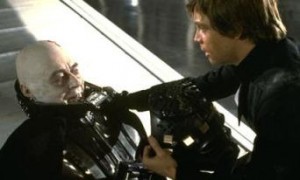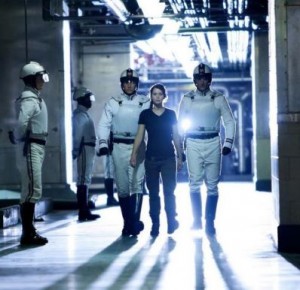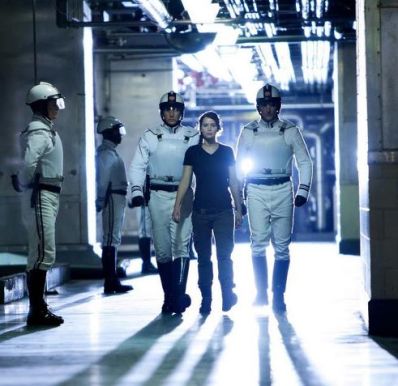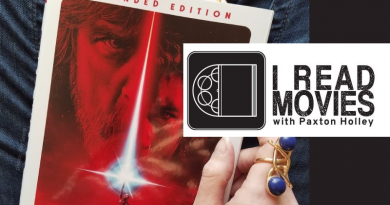Star Wars, The Hunger Games, and the Storytelling Power of Thematic Resonance
Good stories always have great characters. In sweeping epics it might be the valiant hero we want to root for or the chilling villain we love to hate; in less grandiose tales it’s often just relatable people making their path through the triumphs and tragedies, the thrills and travails, of everyday life. The great stories always have something more. What sets them apart are themes that resonate deeply with the reader, viewer, or audience. Great stories don’t just entertain – they make us think, challenge our assumptions or beliefs, or inspire us to do great things ourselves.
The Hunger Games explores the “disturbing issues of modern warfare such as who fights our wars, how they are orchestrated, and the ever-increasing opportunities to observe them being played out.”
~ Suzanne Collins, in her 2006 proposal to Scholastic (p9, The Official Illustrated Movie Companion)
Star Wars is a great story with several levels of thematic resonance. Some of its themes are timeless: the power of love to conquer evil, the necessity of hope even in dark times, and the importance of making the right choices. Other themes, though, are grounded in the era of American history in which George Lucas first conceived the saga and wrote the first film. Nearly four decades later, the context of the original Star Wars is but a distant memory: the dramatic social upheaval of the massive protests sparked by the civil rights and antiwar movements; the debates over the ultimately unsuccessful attempt to ratify the Equal Rights Amendment; a president resigned from office in disgrace, his subordinates indicted and convicted of crimes against the political opposition; soldiers returned home from war not to the celebrations that had greeted their parents a generation earlier, but to the boos and jeers of an angry and jaded public; rampant inflation and hours-long lines for gasoline at the pump. It is hardly surprising that this crisis of public confidence in the nation led Lucas to feel compelled to write an allegory about the terrors of absolutist government, the threat of the military-industrial complex, and the importance of individuals in making a stand against oppression even at the risk of their own lives.  When Ronald Reagan would later co-opt the language of the “evil empire” for the communist enemy and even the term “Star Wars” for a proposed, never-built ballistic missile defense system, it became easy to forget that, in its original themes, Darth Vader and the Empire represented not the Soviet Union, but the Nixon Administration and the threat of a future undemocratic, tyrannical America.
When Ronald Reagan would later co-opt the language of the “evil empire” for the communist enemy and even the term “Star Wars” for a proposed, never-built ballistic missile defense system, it became easy to forget that, in its original themes, Darth Vader and the Empire represented not the Soviet Union, but the Nixon Administration and the threat of a future undemocratic, tyrannical America.
Ultimately, Luke Skywalker’s heroic journey isn’t about defeating the Empire, but rather making the right choices in the moment when none seem evident. It’s an extremely personal story about preservation of the soul, embedded within an epic struggle between ideological factions that have lost sight of the individual. Star Wars entertained the world with the story of a hero mixed with social commentary exactly in the time when inspiration was in short supply.
Perhaps today’s struggles are not quite as extreme as the 1970s, but many of the same challenges and fears once again are prominent in the American public consciousness. Opinion polls show the approval ratings of politicians of both political parties at all-time lows, and significant levels of disgust and mistrust toward both the current president and his predecessor. Troops finally are returning in large numbers from lengthy deployments in two countries that began in the spirit of popular and necessary wars that became increasingly unpopular and seemingly futile over a decade’s time.  American business is faring little better, bearing rightful blame for problems of its own making – bailouts of trillion-dollar corporations with taxpayer money; housing market, financial sector, and mortgage industry meltdowns caused by burst bubbles of risky investment portfolios and rampant financial speculation; income and wealth disparities at historic levels amid the worst Great Recession in nearly a century – all ultimately exemplified by the elitist excesses of the “one percent” and the populists protests of Occupy Wall Street. This latest period of social crisis creates a ripe opportunity for storytellers to capture these themes.
American business is faring little better, bearing rightful blame for problems of its own making – bailouts of trillion-dollar corporations with taxpayer money; housing market, financial sector, and mortgage industry meltdowns caused by burst bubbles of risky investment portfolios and rampant financial speculation; income and wealth disparities at historic levels amid the worst Great Recession in nearly a century – all ultimately exemplified by the elitist excesses of the “one percent” and the populists protests of Occupy Wall Street. This latest period of social crisis creates a ripe opportunity for storytellers to capture these themes.
The Hunger Games makes the most of the opportunity. The central character, Katniss Everdeen, is a well-crafted Strong Female Heroine whose Heroine’s Journey takes her from subsistence poacher in District 12 to combatant in the arena to symbol of a revolution – and ultimately savior of her nation. Along the way she refuses to be defined by others’ expectations for her, instead defining herself by the choices she makes. Her two closest friends are archetypes in their own right: Gale Hawthorne, the angry rebel who grates against the oppression of the Capitol, and Peeta Mellark, the earnest baker who most fears selling out to the bloodthirsty mayhem demanded by the Gamemakers. Her broader circle of allies forms Team Katniss, giving her the network of support and reinforcement she needs to succeed in her goals.
“Everybody who’s drawn to it is drawn to it for Katniss’ journey. It isn’t just about, this is an oppressive culture, this is … a cautionary tale about the future. It’s also that Katniss is struggling to stay human in the face of that, and not lose her humanity. And even though she’s thrust into these Games, she refuses to become a beast within them. And I think that’s what’s beautiful in it, and that’s what people really relate to, is this girl’s character.”
~ director Gary Ross, in an interview with AMC Theaters
Ultimately, though, the real emotional power of The Hunger Games comes from the resonance of its underlying themes. The books warn not to trust everything the government tells you, especially leaders who ask others to sacrifice their lives for the greater good why they observe from afar in the safety of luxury.  The entertainment industry, too, shares equally in Collins’ thematic denunciation. From their own seat of opulence, the Gamemakers exploit children, glamorize violence, and snuff out lives all seemingly without a moment’s hesitation of conscience. The Hungers Games reminds us that when holding on to power or garnering the highest ratings for the next broadcast are what motivates the decision-makers, we shouldn’t be surprised when they are willing to cross any number of moral lines to get what they want, never mind the consequences to individuals. In the citizens of the Capitol, and in the fatalism in many of the Districts before the revolution, we see the frightening power of propaganda – whether governmental or corporate – to shape people’s knowledge, beliefs, and perspective on the world around them. In the first novel, Effie Trinket and the prep team exemplify the twisted mindset exposed raw in the recently published Tribute Guide, an unreality created by the Capitol in which these children are taught it is an honor to be chosen and they should be proud to represent their Districts. The Hunger Games makes us question how much we think we know about our leaders and our government, our country and our economy, and ourselves is really true – and how much of it has been shaped by the messages we read, hear, and see every day.
The entertainment industry, too, shares equally in Collins’ thematic denunciation. From their own seat of opulence, the Gamemakers exploit children, glamorize violence, and snuff out lives all seemingly without a moment’s hesitation of conscience. The Hungers Games reminds us that when holding on to power or garnering the highest ratings for the next broadcast are what motivates the decision-makers, we shouldn’t be surprised when they are willing to cross any number of moral lines to get what they want, never mind the consequences to individuals. In the citizens of the Capitol, and in the fatalism in many of the Districts before the revolution, we see the frightening power of propaganda – whether governmental or corporate – to shape people’s knowledge, beliefs, and perspective on the world around them. In the first novel, Effie Trinket and the prep team exemplify the twisted mindset exposed raw in the recently published Tribute Guide, an unreality created by the Capitol in which these children are taught it is an honor to be chosen and they should be proud to represent their Districts. The Hunger Games makes us question how much we think we know about our leaders and our government, our country and our economy, and ourselves is really true – and how much of it has been shaped by the messages we read, hear, and see every day.
“This could be the catalyst, this could be the motivator, for young people who have been so long dormant in our society. … They have to recognize the political circumstances they’re in, and they have to recognize, in her, that they can change them.”
~ Donald Sutherland, discussing Katniss in an interview with Hitfix
Great characters and compelling plot make an entertaining story. Great themes – the ones that resonate with our experience and values, the ones that make us think and rethink and question our personal choices and the world we live in – can make a story grab hold of us in a deeper and far more intense way. As a franchise, The Hunger Games has a long way to go to prove it has the enduring storytelling weight and cultural significance of Star Wars, but it has a similar timeliness and a heroine people love to root for.
The Hunger Games opens in theaters this Friday, March 23. The early movie reviews compiled at Rotten Tomatoes are strongly positive, and the movie appears poised to be a resounding success with both critics and audiences at the box office.
- Hyperspace Theories: The Curious Case of Kathleen Kennedy’s Retirement - March 10, 2025
- Hyperspace Theories: SKELETON CREW Ahoy! - December 29, 2024
- Hyperspace Theories: WICKED Part I Rises to the Moment - December 6, 2024











Pingback:Stories from a Certain Point of View « Star Wars Books